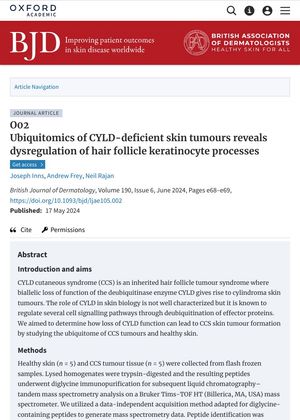Ubiquitomics of CYLD-Deficient Skin Tumors Reveals Dysregulation of Hair Follicle Keratinocyte Processes

TLDR CYLD deficiency in skin tumors disrupts hair follicle cell processes and protein secretion.
The study investigated the ubiquitome of CYLD cutaneous syndrome (CCS) skin tumors and healthy skin to understand how loss of CYLD function leads to tumor formation. Using mass spectrometry, researchers identified 1,273 ubiquitination sites across 649 proteins. They found 305 ubiquitination sites that were either unique or differentially regulated in CCS tumors. Notably, increased ubiquitination of cell surface receptors, including the insulin receptor, suggested enhanced insulin signaling in CCS tumors. Additionally, gene set enrichment analysis indicated increased ubiquitination of secretory granules and extracellular exosomes, implying disrupted protein secretion processes due to CYLD loss. These findings provide insights into the biological effects of CYLD deficiency in skin.



